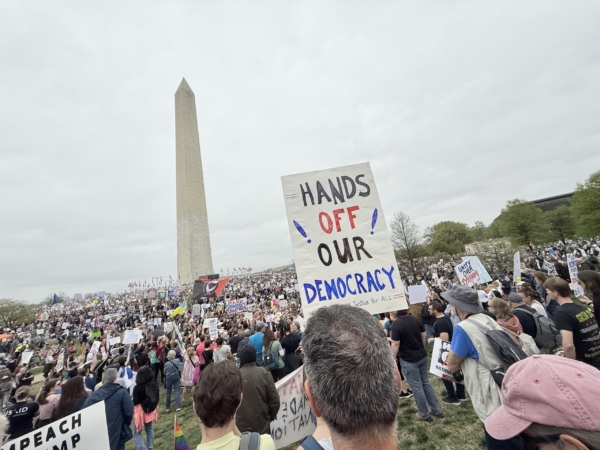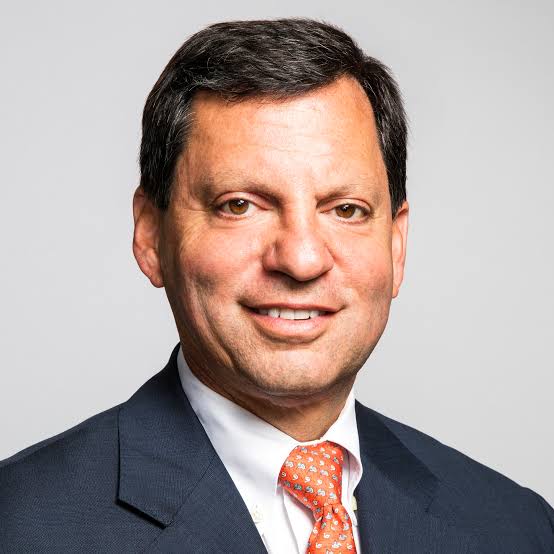Trump Gives Big Pharma a Gift, Undermines Seniors
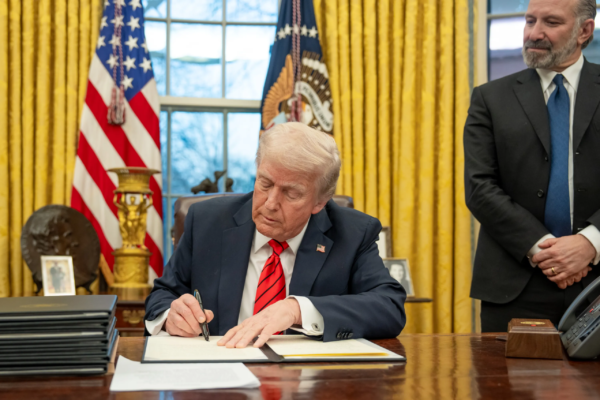
President Trump has signed a sweeping executive order that dilutes Medicare’s ability to negotiate prescription drug prices. Though the White House touts it as a measure to reduce healthcare costs, closer analysis reveals that the real beneficiaries are pharmaceutical companies—not seniors who rely on Medicare for prescription drug coverage.
This move significantly erodes key elements of the Inflation Reduction Act (IRA), a landmark achievement under President Biden which empowered Medicare to directly negotiate drug prices with pharmaceutical companies.
Trump’s executive order mandates Health and Human Services Secretary Robert F. Kennedy Jr. to work with Congress toward revamping Medicare’s price negotiation rules. For Big Pharma, it’s a long-awaited victory. According to Reuters, the order specifically targets the timeline for when drugs become eligible for negotiations, a point of contention for the pharmaceutical industry since the IRA was passed in 2022. This delay aligns with the industry’s lobbying goals to preserve their profits for as long as possible, at the expense of seniors struggling to manage the skyrocketing costs of prescription drugs.
Breaking Down the Delays
Under President Biden’s IRA, Medicare could negotiate prices for ‘small-molecule’ drugs (such as pills and capsules) after nine years on the market, and for complex biologics after thirteen years. Trump’s executive order proposes extending the negotiation eligibility for small-molecule drugs by an additional four years, creating parity with biologics. While this might sound like a minor adjustment, in reality, it gifts Big Pharma a four-year buffer to maintain exorbitant prices on some of the most widely used medications.
“Drugmakers have opposed the IRA’s time frame for negotiation eligibility, arguing it stifles innovation,” Reuters notes. But what does this delay mean for Medicare recipients? For four extra years, Medicare and its beneficiaries will be stuck paying unaffordable prices for essential drugs that could have otherwise been negotiated for lower costs.
Biden’s first round of negotiations under the IRA achieved price cuts of as much as 79% on ten high-cost drugs. These reforms were projected to yield significant savings for Medicare recipients. Trump’s policy reverses course, depriving seniors of immediate access to more affordable treatments while cushioning Big Pharma’s profits.
A Gift to Big Pharma, Wrapped in Pseudo-Reform
To deflect from the pro-pharma nature of the order, the Trump administration is branding it as part of broader “healthcare savings” and offering other token measures. The order encourages the FDA to streamline approval processes for generic and biosimilar medications, which are cheaper alternatives to branded drugs. It also allows states to apply for drug importation programs to buy medications from nations like Canada.
These gestures are not new; they have been proposed in previous administrations, including under Biden, and their benefits are dubious at best. For instance, only one state, Florida, has successfully gained FDA approval to import drugs from Canada. Meanwhile, the financial relief promised by generic drugs often takes years to materialize due to industry legal challenges and other hurdles.
Meanwhile, the pharmaceutical companies’ profits remain untouched as they continue charging exorbitant prices for existing drugs. Worse, as Common Dreams points out, Trump’s executive order was an “outright cave to Big Pharma” designed to “delay implementation of price negotiation reform under the guise of market-friendly tweaks.”
Seniors Are Paying the Price
This policy reversal comes at the worst possible time for seniors, who already face steep out-of-pocket expenses for healthcare. According to Reuters, Trump’s administration also looks to standardize Medicare payment rates across different healthcare facilities, under the pretext of “cost alignment.” While this sounds like it could create savings, healthcare advocates warn that these policies typically shift costs onto individuals, penalizing the very people Medicare is supposed to protect.
Such policies emanate from a Republican playbook that often positions market mechanisms over direct government action in healthcare reform. But when the market in question is controlled by pharmaceutical monopolies, the results are predictable. Prices rise, inequalities deepen, and seniors bear the brunt.
**** For more on the threat the Trump Administration poses to Medicare and Medicaid, listen to the newest episode of our podcast, with special guest Fred Riccardi, President of the Medicare Rights Center. ****
Protesters Across USA Tell Trump & Musk: “Hands off Social Security!”



From Anchorage, Alaska to the National Mall in Washington, D.C., millions of protesters turned out on Saturday for nationwide “Hands Off” demonstrations against the Trump administration’s reckless handling of Social Security, Medicare, Medicaid and a host of other federal programs.
These protests weren’t the usual political rallies. They were deeply personal, driven by countless stories of concern about programs that Americans depend on. Whether emanating from retirees in Florida or students in Nebraska, the message was loud and clear: Don’t mess with our nation’s social insurance programs!
Roger Broom, a 66-year-old from Ohio, shared the fear many feel while holding a sign at his local rally in Columbus. “They can’t talk about cutting Social Security like it’s just budget trimming,” he said. “This is money I’ve earned after working all my life. Without it, I’m done.”
Why now?
The uproar comes from public frustration with the Trump administration’s plans to slash federal spending (and staff) — abetted by Elon Musk and his Department of Government Efficiency (DOGE) — under the phony banner of rooting out ‘waste, fraud, and abuse.’ Their main target so far has been the Social Security Administration – including massive layoffs, planned closures of field offices, and new limitations on phone service.
Because of Trump/Musk/DOGE interference, SSA’s website has already crashed multiple times, preventing beneficiaries from accessing their accounts.
“Even when the site is back online, many customers have not been able to sign in to their accounts — or have logged in only to find information missing. For others, access to the system has been slow, requiring repeated tries to get in.” – Washington Post, 4/7/25
Former SSA Commissioner Martin O’Malley warned that benefit payments could be disrupted because of Trump/Musk/DOGE meddling with Social Security systems.
***Listen to our new podcast interview with Commissioner O’Malley here, in which he warns that Musk is out to “destroy” Social Security.***
Ground Zero in D.C.
The National Mall in Washington, D.C., was one of the largest gathering spots of the day. Hand-painted signs read, “Stability for Seniors” and “Social Security Is Earned, Not a Handout.” One group chanted, “Hey ho, Trump’s gotta go!” While exact crowd estimates are not available, there likely were tens of thousands of protesters in D.C., if not more, of diverse ages and backgrounds.
NCPSSM’s own Government Relations and Policy Director Dan Adcock attended the protest in Washington. “The whole event was a good balm for the firehose of bad news coming out of this administration on a daily basis,” Adcock says. “People really needed it.”
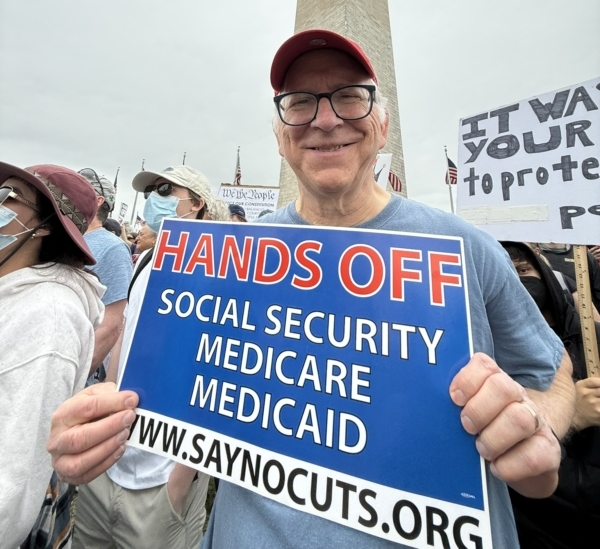


NCPSSM’s Dan Adcock at the National Mall
Adcock and the other protesters heard rousing speeches from members of Congress. Standing on a stage near the Washington Monument, Rep. Jamie Raskin (D-MD) said, “Social Security is a promise made from one generation to another. Breaking that promise is breaking America!”
Al and Bev Mirmelstein drove all the way from Charlottesville, VA to attend the D.C. protest. The Mirmlesteins say they have not been to many protests, but felt they had to participate. “We’ve been quiet too long,” Bev confessed, holding a sign reading, “Don’t Rob Our Future.” Her husband Al said, “They’re putting a target on all of us.”
Medicare and Medicaid Under Fire
Protesters sounded the alarm over the Trump administration’s threats to Medicare and Medicaid, too. The Department of Health and Human Services (HHS), led by Secretary Robert F. Kennedy, Jr., (which oversees Medicare & Medicaid) has announced the elimination of 10,000 jobs in the federal health care workforce, while House Republicans have maneuvered to cut nearly $1 trillion from Medicaid.
“I’m terrified for my mom,” said Archer Moran, who attended a rally in Florida near Trump’s golf course. He explained that his mother, a Medicaid recipient, would struggle to survive without her health coverage. “They call them cuts. It’s taking away someone’s lifeline. Lives are literally at risk here.”
Small Towns, Big Audiences
The protests extended from the coasts to the Midwest. In Omaha, Nebraska, nearly a thousand people gathered in Memorial Park. Chants of “Protect what’s ours!” could be heard along Dodge Street, while passing cars honked in solidarity. Protester Jean Zinnen brought her 15-year-old granddaughter to the Omaha demonstration. “She needs to see this is an example of showing up for what matters,” Zinnen said, as she clutched a sign reading, “Our Rights, Our Fight.”
Student Calvin Snyder explained why he felt compelled to protest. “Decisions being made (in Washington) that impact the future this badly shouldn’t be met with quiet acceptance,” said Snyder. “It’s not just anger for self-interest. This is for everyone relying on these programs to live.”
Hundreds of people protested, not only in major cities, but in small towns like Sylva, North Carolina, marching through newly blooming spring neighborhoods in solidarity with demonstrators across the country.
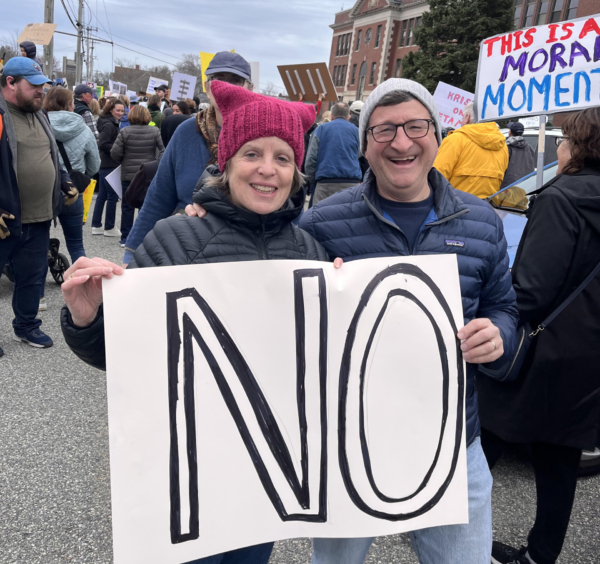


Providence, RI
What’s Next?
The protests delivered a loud and defiant message to those in charge, while remaining peaceful. When asked about the protests, President Trump offered a rambling, incoherent response:
“A lot of them were there because what we witnessed was a terrible thing. And we’ve seen it over the years. You know that better than anyone who would know it. And I know it… I think it’s a shame, a disgrace, and it has to stop.”
In addition to the nonsensical gobbledygook, Trump and his administration have promoted the lie that Social Security is rife with fraud, and the myth that “Democrats” are promoting illegal immigration by enticing migrants with Social Security benefits. Not only is this a discredited conspiracy theory, but undocumented workers are legally barred from collecting Social Security (though many pay into the system, increasing Social Security’s revenues).
Organizers of Saturday’s protests insist they weren’t just a one-day event. For many protesters, this was part of an ongoing campaign to resist the Trump administration. Whether at town halls, in the voting booth, or on the streets, resistors don’t appear ready to back down. “This isn’t something people are going to forget,” said Omaha protester Susan Calef.
“The positive energy of these protests reminds people that there are millions of Americans who feel the same way they do,” says NCPSSM’s Dan Adcock. “As long as we hold rallies like these, organize, and vote, we can reverse the awful things that are going on right now.”
Sources:
https://edition.cnn.com/2025/04/05/us/hands-off-protests-trump-musk/index.html
https://www.aljazeera.com/news/2025/4/5/hands-off-protesters-rally-across-us-to-oppose-trumps-policies
https://www.npr.org/2025/04/05/nx-s1-5353388/hands-off-protests-washington-dc
https://www.politico.com/news/2025/04/05/hands-off-protests-trump-us-00274352
https://nebraskaexaminer.com/2025/04/06/thousands-in-memorial-park-protest-federal-actions-as-part-of-national-han
Martin O’Malley Makes the Case Against Trump, Musk & DOGE on Our Podcast
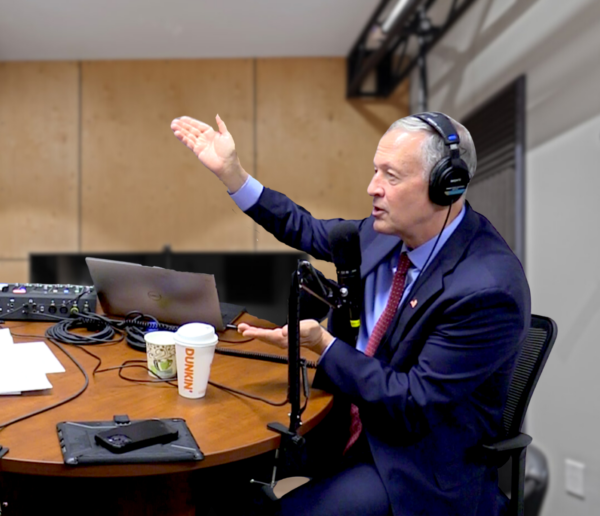


This week’s “You Earned This” podcast features a special VIP guest: former Maryland Governor and Social Security Commissioner Martin O’Malley. It’s a conversation that everyone who cares about the future of Social Security should hear. O’Malley, who led the Social Security Administration (SSA) during the final year of Joe Biden’s presidency, conveys a clear message: Social Security is under attack, and the consequences for millions of Americans couldn’t be more dire.
O’Malley doesn’t mince words when reflecting on the state of the SSA under what he terms the “co-presidency” of Donald Trump and Elon Musk. “It breaks my heart to see the way that Musk and Trump are just taking a meat cleaver to this agency and kneecapping its ability to serve the public,” he said during our interview. “It’s not fair. It’s not right. People need to wake up to the very real threat that this poses to their earned benefits.”
2024: A Year of Progress
O’Malley described his year at the SSA as one of the most rewarding periods of his life. Tasked with leading an agency that had been chronically underfunded, he sought to rally the workforce that delivers Americans’ retirement and disability benefits. Years of congressional budget neglect had reduced SSA staffing to a 50-year low, while the demand for services was at an all-time high.
O’Malley took pride in working with SSA’s dedicated employees, who, despite these challenges, had a shared mission to serve the public. Together, they focused on addressing severe customer service backlogs, improving fraud prevention, and ensuring benefits were delivered on time. His team implemented critical changes, including improved data sharing with suspect banking institutions to combat fraud. Under O’Malley’s leadership, SSA reduced wait times on the agency’s 1-800 phone line from 40 minutes to twelve minutes, and shrank the delays for Social Security Disability Insurance hearings, among other improvements.
“I hadn’t felt that fully engaged in work since my time as mayor of Baltimore,” O’Malley said. “Watching the agency turn around, even on a very leaky battleship — even as we coped with inadequate resources and decades of neglect — was well worth doing.”
But the gains O’Malley and his team worked so hard to achieve were quickly undone.
The Sabotage of Social Security
According to O’Malley, the reversal began almost immediately after Trump took office. Under the new administration, the SSA announced severe staffing cuts, including mass firings. Entire offices, including those dedicated to improving customer service and promoting equal opportunity, were illegally purged. “Carrots and sticks” were used to incentivize early retirement, creating a hostile work environment that alienated the dedicated public servants O’Malley once led.
“Trump, Musk, and DOGE have really (abused) a group of people that I came to love very quickly. The workers believed in a shared mission, that what they’re doing matters so much to so many. That’s the only reason people hung in there through all of the tough years,” O’Malley lamented.
After the induced early retirements and firings, “people saw their colleagues hugging each other goodbye. There were tears… and cardboard boxes on top of hoods of cars,” O’Malley explained. “SSA leadership essentially said, ‘Hey, joyous news! Everybody who feels compelled to leave the agency: quit now without letting the door hit your backside on the way out.’”
O’Malley estimates that the reductions in staffing will ultimately result in 10,000 SSA jobs disappearing — a 20% cut. The consequence, he says, will be a depleted, overburdened workforce unable to meet the demands of an aging population, at a time when 10,000 Baby Boomers reach retirement age every day. This systematic gutting of the already SSA has exacerbated wait times on phone lines and at field offices, caused website crashes, and increased frustration for the everyday Americans who depend on these vital services.
Musk’s Ideology of Brutal Efficiency



O’Malley doesn’t hold back on what he sees as the Trump administration’s true intentions:
“Elon Musk wants to destroy Social Security. It doesn’t fit with his worldview. He thinks people that are elderly, people who are disabled are, by their very nature, wasteful.”
Musk has publicly derided empathy as a weakness, a philosophy that seems to underpin his approach to governance. O’Malley pointed out that Musk views Social Security beneficiaries as “inefficiencies” or, worse, “dispensable.”
“The ‘waste’ that Musk is talking about are people who are elderly and can’t work, people who are disabled and can’t work, children who lose parents,” O’Malley explained. “That’s why he wants to go after a program that he thinks subsidizes people who supposedly are ‘a drain on the system.’”
Musk’s fake hunt for waste and fraud is hypocritical, O’Malley noted, given the billionaire’s reliance on federal contracts worth $8 million per day. Yet instead of safeguarding Social Security, Musk has partnered with Trump to undermine a program that keeps seniors from falling into poverty.
Trump & Musk’s Falsehoods
O’Malley also called out Trump and Musk for spreading disinformation about Social Security, including absurd claims about rampant fraud:
“Donald Trump stands up in his non-state of the union address and implies there are 360-year-olds collecting Social Security, people who presumably came here for the founding of Jamestown or Plymouth. Totally untrue.”
O’Malley re-iterated a darkly funny, but apt remark he made at a Social Security hearing on Capitol Hill on Tuesday. “The zombie apocalypse is not real. There aren’t millions of people wandering all around the cities of America with checks spewing out of their cadaverous pockets.”
The truth, O’Malley explained, is that fraud within Social Security is extraordinarily rare, despite Trump and Musk’s bogus claims. Musk alleged that 40% of the calls on SSA’s phone line are fraudsters. In truth, says O’Malley, for every 3,100 calls taken by SSA’s call center, only one results in a successful attempt at direct deposit fraud. That’s about .0007%! Of course, ideally there would be zero fraud. In fact, new policies implemented during O’Malley’s tenure targeted improper payments. Unfortunately, those reforms likely are out the window now.
Undermining Public Confidence in Social Security
O’Malley expressed his belief that Trump and Musk aim to erode public confidence in Social Security as a prelude to dismantling it entirely. “I have come to the conclusion that Trump and Musk actually want to sour the public against the SSA. And they do that by destroying its ability to provide customer service for people who work their whole lives for these benefits,” he explained.
By making it harder for Americans to access their benefits and by spreading false narratives of ‘waste, fraud, and abuse,’ they hope to sway public opinion against the program. Once that confidence is eroded, the ultimate goal is clear: cut, privatize, and even raid Social Security for cash.
“I could even imagine a sinister scenario,” O’Malley speculated, “where they say, ‘Hey, Social Security is broken. It was always going to go broke and it doesn’t work. So we’re going to have to liquidate the trust fund.” If that were to happen, the $2.7 trillion in the trust fund could be misdirected for unrelated purposes — including a permanent tax cut for the wealthy and big corporations.



O’Malley speaks at a Save Our Social Security rally in Florida last month
A Call to Action
Social Security isn’t a government handout. It’s an earned benefit that keeps seniors and people with disabilities financially afloat. It’s a contract between generations, ensuring workers who pay into the system today can claim benefits upon retirement, disability, or the death of a family breadwinner.
As O’Malley pointed out, the vast majority of Americans support expanding Social Security, not weakening it. “80% of Americans believe Social Security should be strengthened and made better,” he said. But maintaining that support requires action. “Members of Congress need to hear directly from the people,” O’Malley urged. “Americans see the threat and they want them to ‘stop the steal’ of their Social Security benefits.”
Since leaving his post at SSA, O’Malley has been traveling the country to advocate for Social Security and to speak out against the DOGE squad’s interference in the program. He has already delivered two speeches in Florida, warning seniors of what’s at stake, and is heading to Oklahoma next. While he may no longer be Social Security Commissioner, Martin O’Malley remains fiercely devoted to defending the agency he led — and the 73 million people who depend on it.
***********************
LISTEN TO GOV. O’MALLEY’S PODCAST INTERVIEW here.
READ OUR EXCLUSIVE INTERVIEW WITH SSA WHISTLEBLOWER LAURA HALTZEL here.
7 Questions for Trump’s Social Security Commissioner Nominee



President Trump’s pick to head the Social Security Administration, Frank Bisignano, will have his Senate confirmation hearing on Tuesday morning. The financial services CEO and Republican donor has been waiting in the wings since the Trump administration took over in January. In the meantime, Elon Musk and his DOGE squad have invaded the Social Security Administration (SSA) and wreaked considerable havoc on the agency — alarming seniors’ advocates and a sizeable swath of the general public. Under the banner of rooting out “fraud” (of which they have found none), Musk’s minions are in the process of rendering SSA dysfunctional and jeopardizing the delivery of benefits.
In the absence of a confirmed commissioner, Acting SSA chief Leland Dudek has abetted Musk and DOGE every step of the way, allowing them access to the sensitive personal data of 73 million Americans for no justifiable reason, radically reducing the workforce that serves Social Security customers, closing field offices, and slashing services on the agency’s 1-800 phone number that seniors rely on. He claims to be “following orders” from President Trump and Elon Musk. Dudek threatened to “shut down” SSA after a federal judge ruled against the agency’s decision to grant Musk and DOGE access to beneficiaries’ private data.
Bisignano has no appreciable experience in public service in general — or Social Security in particular — but Trump wants him to run one of the federal agencies that most closely touches Americans’ lives every day. We don’t know much about what Bisignano thinks of Social Security or what he will do to the program if confirmed.
Here are 7 questions we would like to see Frank Bisignano answer at Tuesdays’ hearing:
#1 Do you agree with the changes that Musk and Dudek have made at SSA pending your confirmation?
#2 A federal judge has ruled that Musk AND DOGE should not have access to the personal data of 73 million Americans. Do you agree or disagree?
#3 SSA has been chronically underfunded and understaffed. With 10,000 Baby Boomers reaching 65 every day, is this really the time to be slashing the workforce and closing field offices?
#4 Do you believe that Social Security itself or the functions of the SSA should be privatized? And if Social Security were to be privatized, would you and your peers in the financial services industry benefit?
#5 Do you think beneficiaries who have been overpaid (usually through no fault of their own) should have 100% of their Social Security checks clawed back pending repayment?
#6 Elon Musk recently called Social Security a Ponzi Scheme. Do you agree?
#7 What do you feel is the fair and just solution to the projected depletion of the Social Security trust fund? Do you support raising the Social Security retirement age?
Frankly, we don’t expect Bisignano to answer these kinds of questions, but they should be put to him on the record, anyway. We hope that committee members (especially Democrats including ranking member Ron Wyden, Bernie Sanders and Elizabeth Warren) will press the nominee on these extremely important issues to American seniors, people with disabilities, and their families. At this existential moment for Social Security, the public deserves nothing less.
Jon “Bowzer” Bauman Sings the Praises of Social Security



Jon “Bowzer” Bauman is best known from the 70s tv show “Sha Na Na,” where he charmed audiences with his greaser persona, elastic expressions, and basso renditions of 1950s pop music classics — including the band’s cover of “Goodnight, Sweetheart.” Over the years, though, Bowzer has evolved from doo wop revivalist to seniors’ activist — especially when it comes to Social Security. He talked about his evolution from pure entertainment to entertainment and advocacy on a recent episode of the “You Earned This” podcast.
Bowzer’s Shift to Advocacy
Bowzer says that his advocacy work stems from a belief that programs like Social Security and Medicare are lifelines, not just for retirees, but for disabled workers and families too. “Social Security and Medicare represent the values of fairness and mutual support in our country,” he shared. He sees protecting them as a moral responsibility that ensures dignity for millions of Americans.
In the early 2010s, Bowzer teamed up with the National Committee to Preserve Social Security and Medicare to bolster public support for Social Security. (He now is Chair of Social Security Works’ political action committee.) “It’s not an entitlement. It’s what people paid into. It’s their money and their benefits,” he said. His mission is to counter misinformation and ensure the public knows what’s at stake, especially in the face of persistent proposals from the political right to cut and privatize the program.



Bauman, 77, also shared that he has officially stepped away from touring. He recently completed a series of cruise ship performances but admitted during the podcast that his touring days are mostly behind him. “I’ve reached the age where touring takes too much of a toll physically.” Though he’ll miss being on stage, he said he’s fully committed to his advocacy work and making a difference offstage.
Carrying Stage Skills Into Advocacy
Even though activism is his focus now, Bauman’s time as “Bowzer” still shapes the way he connects with people. His years in Sha Na Na made him an expert in grabbing and holding attention — from live venues like Carnegie Hall to national television.
“The power of a message is about how it lands,” Bauman said. He noted that his ability to simplify complex topics and relate them to everyday experiences makes his advocacy more accessible. “What always mattered most was the ability to connect and communicate. Whether it’s music or policy, that never changes,” he said.
During the podcast, he reflected on the connection between his past and present work. “It’s all about communication. If I could get an entire crowd to sing along to ‘Goodnight Sweetheart,’ then I know I can convince a room full of people why Social Security matters,” he said.
His memories of performing tend to circle back to the causes he champions now. He compared rock and roll’s enduring power to the collective effort that protects Social Security. “Both are about bringing people together and standing for something that endures.” (Social Security celebrates its 90th anniversary later this year!)
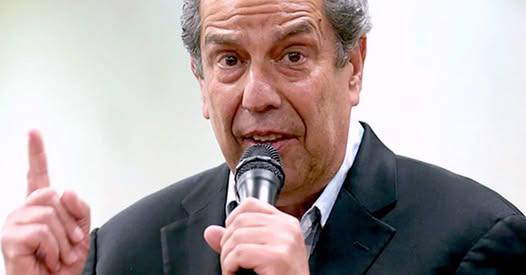


The Need to Protect Social Security
He called out critics who frame it as outdated or a burden. “This is about dignity. Social Security allows people to live independently instead of struggling in despair,” he said. Bauman affirmed that Social Security isn’t a government handout; it’s an earned benefit for more than 70 million workers. He firmly believes cutting or privatizing the program would break trust with generations of Americans.
He also didn’t shy away from addressing related issues, such as medical costs and prescription drug prices, and how they connect to Social Security. He said, “You can’t separate Social Security from things like health care. They work hand in hand.”
A Call to Action
Bauman concluded the podcast with a message about the importance of protecting Social Security and Medicare not just for today’s seniors, but for generations to come. “This is about who we are as a society. How we treat our seniors says everything about us,” he explained.
There’s still a lot of work ahead, and Bauman shows no signs of slowing down. Whether it’s through advocating with organizations, speaking to policymakers, or educating the public, his commitment to his mission is clear.
“Social Security isn’t just a program,” Bauman said. “It’s a promise. And I’ll keep fighting to make sure that promise is never broken.”
******************************************************
Listen to Jon “Bowzer” Bauman’s podcast interview here.
Watch a snippet from Bowzer’s “Truth Tour” with NCPSSM in 2012.
Trump Gives Big Pharma a Gift, Undermines Seniors



President Trump has signed a sweeping executive order that dilutes Medicare’s ability to negotiate prescription drug prices. Though the White House touts it as a measure to reduce healthcare costs, closer analysis reveals that the real beneficiaries are pharmaceutical companies—not seniors who rely on Medicare for prescription drug coverage.
This move significantly erodes key elements of the Inflation Reduction Act (IRA), a landmark achievement under President Biden which empowered Medicare to directly negotiate drug prices with pharmaceutical companies.
Trump’s executive order mandates Health and Human Services Secretary Robert F. Kennedy Jr. to work with Congress toward revamping Medicare’s price negotiation rules. For Big Pharma, it’s a long-awaited victory. According to Reuters, the order specifically targets the timeline for when drugs become eligible for negotiations, a point of contention for the pharmaceutical industry since the IRA was passed in 2022. This delay aligns with the industry’s lobbying goals to preserve their profits for as long as possible, at the expense of seniors struggling to manage the skyrocketing costs of prescription drugs.
Breaking Down the Delays
Under President Biden’s IRA, Medicare could negotiate prices for ‘small-molecule’ drugs (such as pills and capsules) after nine years on the market, and for complex biologics after thirteen years. Trump’s executive order proposes extending the negotiation eligibility for small-molecule drugs by an additional four years, creating parity with biologics. While this might sound like a minor adjustment, in reality, it gifts Big Pharma a four-year buffer to maintain exorbitant prices on some of the most widely used medications.
“Drugmakers have opposed the IRA’s time frame for negotiation eligibility, arguing it stifles innovation,” Reuters notes. But what does this delay mean for Medicare recipients? For four extra years, Medicare and its beneficiaries will be stuck paying unaffordable prices for essential drugs that could have otherwise been negotiated for lower costs.
Biden’s first round of negotiations under the IRA achieved price cuts of as much as 79% on ten high-cost drugs. These reforms were projected to yield significant savings for Medicare recipients. Trump’s policy reverses course, depriving seniors of immediate access to more affordable treatments while cushioning Big Pharma’s profits.
A Gift to Big Pharma, Wrapped in Pseudo-Reform
To deflect from the pro-pharma nature of the order, the Trump administration is branding it as part of broader “healthcare savings” and offering other token measures. The order encourages the FDA to streamline approval processes for generic and biosimilar medications, which are cheaper alternatives to branded drugs. It also allows states to apply for drug importation programs to buy medications from nations like Canada.
These gestures are not new; they have been proposed in previous administrations, including under Biden, and their benefits are dubious at best. For instance, only one state, Florida, has successfully gained FDA approval to import drugs from Canada. Meanwhile, the financial relief promised by generic drugs often takes years to materialize due to industry legal challenges and other hurdles.
Meanwhile, the pharmaceutical companies’ profits remain untouched as they continue charging exorbitant prices for existing drugs. Worse, as Common Dreams points out, Trump’s executive order was an “outright cave to Big Pharma” designed to “delay implementation of price negotiation reform under the guise of market-friendly tweaks.”
Seniors Are Paying the Price
This policy reversal comes at the worst possible time for seniors, who already face steep out-of-pocket expenses for healthcare. According to Reuters, Trump’s administration also looks to standardize Medicare payment rates across different healthcare facilities, under the pretext of “cost alignment.” While this sounds like it could create savings, healthcare advocates warn that these policies typically shift costs onto individuals, penalizing the very people Medicare is supposed to protect.
Such policies emanate from a Republican playbook that often positions market mechanisms over direct government action in healthcare reform. But when the market in question is controlled by pharmaceutical monopolies, the results are predictable. Prices rise, inequalities deepen, and seniors bear the brunt.
**** For more on the threat the Trump Administration poses to Medicare and Medicaid, listen to the newest episode of our podcast, with special guest Fred Riccardi, President of the Medicare Rights Center. ****
Protesters Across USA Tell Trump & Musk: “Hands off Social Security!”



From Anchorage, Alaska to the National Mall in Washington, D.C., millions of protesters turned out on Saturday for nationwide “Hands Off” demonstrations against the Trump administration’s reckless handling of Social Security, Medicare, Medicaid and a host of other federal programs.
These protests weren’t the usual political rallies. They were deeply personal, driven by countless stories of concern about programs that Americans depend on. Whether emanating from retirees in Florida or students in Nebraska, the message was loud and clear: Don’t mess with our nation’s social insurance programs!
Roger Broom, a 66-year-old from Ohio, shared the fear many feel while holding a sign at his local rally in Columbus. “They can’t talk about cutting Social Security like it’s just budget trimming,” he said. “This is money I’ve earned after working all my life. Without it, I’m done.”
Why now?
The uproar comes from public frustration with the Trump administration’s plans to slash federal spending (and staff) — abetted by Elon Musk and his Department of Government Efficiency (DOGE) — under the phony banner of rooting out ‘waste, fraud, and abuse.’ Their main target so far has been the Social Security Administration – including massive layoffs, planned closures of field offices, and new limitations on phone service.
Because of Trump/Musk/DOGE interference, SSA’s website has already crashed multiple times, preventing beneficiaries from accessing their accounts.
“Even when the site is back online, many customers have not been able to sign in to their accounts — or have logged in only to find information missing. For others, access to the system has been slow, requiring repeated tries to get in.” – Washington Post, 4/7/25
Former SSA Commissioner Martin O’Malley warned that benefit payments could be disrupted because of Trump/Musk/DOGE meddling with Social Security systems.
***Listen to our new podcast interview with Commissioner O’Malley here, in which he warns that Musk is out to “destroy” Social Security.***
Ground Zero in D.C.
The National Mall in Washington, D.C., was one of the largest gathering spots of the day. Hand-painted signs read, “Stability for Seniors” and “Social Security Is Earned, Not a Handout.” One group chanted, “Hey ho, Trump’s gotta go!” While exact crowd estimates are not available, there likely were tens of thousands of protesters in D.C., if not more, of diverse ages and backgrounds.
NCPSSM’s own Government Relations and Policy Director Dan Adcock attended the protest in Washington. “The whole event was a good balm for the firehose of bad news coming out of this administration on a daily basis,” Adcock says. “People really needed it.”



NCPSSM’s Dan Adcock at the National Mall
Adcock and the other protesters heard rousing speeches from members of Congress. Standing on a stage near the Washington Monument, Rep. Jamie Raskin (D-MD) said, “Social Security is a promise made from one generation to another. Breaking that promise is breaking America!”
Al and Bev Mirmelstein drove all the way from Charlottesville, VA to attend the D.C. protest. The Mirmlesteins say they have not been to many protests, but felt they had to participate. “We’ve been quiet too long,” Bev confessed, holding a sign reading, “Don’t Rob Our Future.” Her husband Al said, “They’re putting a target on all of us.”
Medicare and Medicaid Under Fire
Protesters sounded the alarm over the Trump administration’s threats to Medicare and Medicaid, too. The Department of Health and Human Services (HHS), led by Secretary Robert F. Kennedy, Jr., (which oversees Medicare & Medicaid) has announced the elimination of 10,000 jobs in the federal health care workforce, while House Republicans have maneuvered to cut nearly $1 trillion from Medicaid.
“I’m terrified for my mom,” said Archer Moran, who attended a rally in Florida near Trump’s golf course. He explained that his mother, a Medicaid recipient, would struggle to survive without her health coverage. “They call them cuts. It’s taking away someone’s lifeline. Lives are literally at risk here.”
Small Towns, Big Audiences
The protests extended from the coasts to the Midwest. In Omaha, Nebraska, nearly a thousand people gathered in Memorial Park. Chants of “Protect what’s ours!” could be heard along Dodge Street, while passing cars honked in solidarity. Protester Jean Zinnen brought her 15-year-old granddaughter to the Omaha demonstration. “She needs to see this is an example of showing up for what matters,” Zinnen said, as she clutched a sign reading, “Our Rights, Our Fight.”
Student Calvin Snyder explained why he felt compelled to protest. “Decisions being made (in Washington) that impact the future this badly shouldn’t be met with quiet acceptance,” said Snyder. “It’s not just anger for self-interest. This is for everyone relying on these programs to live.”
Hundreds of people protested, not only in major cities, but in small towns like Sylva, North Carolina, marching through newly blooming spring neighborhoods in solidarity with demonstrators across the country.



Providence, RI
What’s Next?
The protests delivered a loud and defiant message to those in charge, while remaining peaceful. When asked about the protests, President Trump offered a rambling, incoherent response:
“A lot of them were there because what we witnessed was a terrible thing. And we’ve seen it over the years. You know that better than anyone who would know it. And I know it… I think it’s a shame, a disgrace, and it has to stop.”
In addition to the nonsensical gobbledygook, Trump and his administration have promoted the lie that Social Security is rife with fraud, and the myth that “Democrats” are promoting illegal immigration by enticing migrants with Social Security benefits. Not only is this a discredited conspiracy theory, but undocumented workers are legally barred from collecting Social Security (though many pay into the system, increasing Social Security’s revenues).
Organizers of Saturday’s protests insist they weren’t just a one-day event. For many protesters, this was part of an ongoing campaign to resist the Trump administration. Whether at town halls, in the voting booth, or on the streets, resistors don’t appear ready to back down. “This isn’t something people are going to forget,” said Omaha protester Susan Calef.
“The positive energy of these protests reminds people that there are millions of Americans who feel the same way they do,” says NCPSSM’s Dan Adcock. “As long as we hold rallies like these, organize, and vote, we can reverse the awful things that are going on right now.”
Sources:
https://edition.cnn.com/2025/04/05/us/hands-off-protests-trump-musk/index.html
https://www.aljazeera.com/news/2025/4/5/hands-off-protesters-rally-across-us-to-oppose-trumps-policies
https://www.npr.org/2025/04/05/nx-s1-5353388/hands-off-protests-washington-dc
https://www.politico.com/news/2025/04/05/hands-off-protests-trump-us-00274352
https://nebraskaexaminer.com/2025/04/06/thousands-in-memorial-park-protest-federal-actions-as-part-of-national-han
Martin O’Malley Makes the Case Against Trump, Musk & DOGE on Our Podcast



This week’s “You Earned This” podcast features a special VIP guest: former Maryland Governor and Social Security Commissioner Martin O’Malley. It’s a conversation that everyone who cares about the future of Social Security should hear. O’Malley, who led the Social Security Administration (SSA) during the final year of Joe Biden’s presidency, conveys a clear message: Social Security is under attack, and the consequences for millions of Americans couldn’t be more dire.
O’Malley doesn’t mince words when reflecting on the state of the SSA under what he terms the “co-presidency” of Donald Trump and Elon Musk. “It breaks my heart to see the way that Musk and Trump are just taking a meat cleaver to this agency and kneecapping its ability to serve the public,” he said during our interview. “It’s not fair. It’s not right. People need to wake up to the very real threat that this poses to their earned benefits.”
2024: A Year of Progress
O’Malley described his year at the SSA as one of the most rewarding periods of his life. Tasked with leading an agency that had been chronically underfunded, he sought to rally the workforce that delivers Americans’ retirement and disability benefits. Years of congressional budget neglect had reduced SSA staffing to a 50-year low, while the demand for services was at an all-time high.
O’Malley took pride in working with SSA’s dedicated employees, who, despite these challenges, had a shared mission to serve the public. Together, they focused on addressing severe customer service backlogs, improving fraud prevention, and ensuring benefits were delivered on time. His team implemented critical changes, including improved data sharing with suspect banking institutions to combat fraud. Under O’Malley’s leadership, SSA reduced wait times on the agency’s 1-800 phone line from 40 minutes to twelve minutes, and shrank the delays for Social Security Disability Insurance hearings, among other improvements.
“I hadn’t felt that fully engaged in work since my time as mayor of Baltimore,” O’Malley said. “Watching the agency turn around, even on a very leaky battleship — even as we coped with inadequate resources and decades of neglect — was well worth doing.”
But the gains O’Malley and his team worked so hard to achieve were quickly undone.
The Sabotage of Social Security
According to O’Malley, the reversal began almost immediately after Trump took office. Under the new administration, the SSA announced severe staffing cuts, including mass firings. Entire offices, including those dedicated to improving customer service and promoting equal opportunity, were illegally purged. “Carrots and sticks” were used to incentivize early retirement, creating a hostile work environment that alienated the dedicated public servants O’Malley once led.
“Trump, Musk, and DOGE have really (abused) a group of people that I came to love very quickly. The workers believed in a shared mission, that what they’re doing matters so much to so many. That’s the only reason people hung in there through all of the tough years,” O’Malley lamented.
After the induced early retirements and firings, “people saw their colleagues hugging each other goodbye. There were tears… and cardboard boxes on top of hoods of cars,” O’Malley explained. “SSA leadership essentially said, ‘Hey, joyous news! Everybody who feels compelled to leave the agency: quit now without letting the door hit your backside on the way out.’”
O’Malley estimates that the reductions in staffing will ultimately result in 10,000 SSA jobs disappearing — a 20% cut. The consequence, he says, will be a depleted, overburdened workforce unable to meet the demands of an aging population, at a time when 10,000 Baby Boomers reach retirement age every day. This systematic gutting of the already SSA has exacerbated wait times on phone lines and at field offices, caused website crashes, and increased frustration for the everyday Americans who depend on these vital services.
Musk’s Ideology of Brutal Efficiency



O’Malley doesn’t hold back on what he sees as the Trump administration’s true intentions:
“Elon Musk wants to destroy Social Security. It doesn’t fit with his worldview. He thinks people that are elderly, people who are disabled are, by their very nature, wasteful.”
Musk has publicly derided empathy as a weakness, a philosophy that seems to underpin his approach to governance. O’Malley pointed out that Musk views Social Security beneficiaries as “inefficiencies” or, worse, “dispensable.”
“The ‘waste’ that Musk is talking about are people who are elderly and can’t work, people who are disabled and can’t work, children who lose parents,” O’Malley explained. “That’s why he wants to go after a program that he thinks subsidizes people who supposedly are ‘a drain on the system.’”
Musk’s fake hunt for waste and fraud is hypocritical, O’Malley noted, given the billionaire’s reliance on federal contracts worth $8 million per day. Yet instead of safeguarding Social Security, Musk has partnered with Trump to undermine a program that keeps seniors from falling into poverty.
Trump & Musk’s Falsehoods
O’Malley also called out Trump and Musk for spreading disinformation about Social Security, including absurd claims about rampant fraud:
“Donald Trump stands up in his non-state of the union address and implies there are 360-year-olds collecting Social Security, people who presumably came here for the founding of Jamestown or Plymouth. Totally untrue.”
O’Malley re-iterated a darkly funny, but apt remark he made at a Social Security hearing on Capitol Hill on Tuesday. “The zombie apocalypse is not real. There aren’t millions of people wandering all around the cities of America with checks spewing out of their cadaverous pockets.”
The truth, O’Malley explained, is that fraud within Social Security is extraordinarily rare, despite Trump and Musk’s bogus claims. Musk alleged that 40% of the calls on SSA’s phone line are fraudsters. In truth, says O’Malley, for every 3,100 calls taken by SSA’s call center, only one results in a successful attempt at direct deposit fraud. That’s about .0007%! Of course, ideally there would be zero fraud. In fact, new policies implemented during O’Malley’s tenure targeted improper payments. Unfortunately, those reforms likely are out the window now.
Undermining Public Confidence in Social Security
O’Malley expressed his belief that Trump and Musk aim to erode public confidence in Social Security as a prelude to dismantling it entirely. “I have come to the conclusion that Trump and Musk actually want to sour the public against the SSA. And they do that by destroying its ability to provide customer service for people who work their whole lives for these benefits,” he explained.
By making it harder for Americans to access their benefits and by spreading false narratives of ‘waste, fraud, and abuse,’ they hope to sway public opinion against the program. Once that confidence is eroded, the ultimate goal is clear: cut, privatize, and even raid Social Security for cash.
“I could even imagine a sinister scenario,” O’Malley speculated, “where they say, ‘Hey, Social Security is broken. It was always going to go broke and it doesn’t work. So we’re going to have to liquidate the trust fund.” If that were to happen, the $2.7 trillion in the trust fund could be misdirected for unrelated purposes — including a permanent tax cut for the wealthy and big corporations.



O’Malley speaks at a Save Our Social Security rally in Florida last month
A Call to Action
Social Security isn’t a government handout. It’s an earned benefit that keeps seniors and people with disabilities financially afloat. It’s a contract between generations, ensuring workers who pay into the system today can claim benefits upon retirement, disability, or the death of a family breadwinner.
As O’Malley pointed out, the vast majority of Americans support expanding Social Security, not weakening it. “80% of Americans believe Social Security should be strengthened and made better,” he said. But maintaining that support requires action. “Members of Congress need to hear directly from the people,” O’Malley urged. “Americans see the threat and they want them to ‘stop the steal’ of their Social Security benefits.”
Since leaving his post at SSA, O’Malley has been traveling the country to advocate for Social Security and to speak out against the DOGE squad’s interference in the program. He has already delivered two speeches in Florida, warning seniors of what’s at stake, and is heading to Oklahoma next. While he may no longer be Social Security Commissioner, Martin O’Malley remains fiercely devoted to defending the agency he led — and the 73 million people who depend on it.
***********************
LISTEN TO GOV. O’MALLEY’S PODCAST INTERVIEW here.
READ OUR EXCLUSIVE INTERVIEW WITH SSA WHISTLEBLOWER LAURA HALTZEL here.
7 Questions for Trump’s Social Security Commissioner Nominee



President Trump’s pick to head the Social Security Administration, Frank Bisignano, will have his Senate confirmation hearing on Tuesday morning. The financial services CEO and Republican donor has been waiting in the wings since the Trump administration took over in January. In the meantime, Elon Musk and his DOGE squad have invaded the Social Security Administration (SSA) and wreaked considerable havoc on the agency — alarming seniors’ advocates and a sizeable swath of the general public. Under the banner of rooting out “fraud” (of which they have found none), Musk’s minions are in the process of rendering SSA dysfunctional and jeopardizing the delivery of benefits.
In the absence of a confirmed commissioner, Acting SSA chief Leland Dudek has abetted Musk and DOGE every step of the way, allowing them access to the sensitive personal data of 73 million Americans for no justifiable reason, radically reducing the workforce that serves Social Security customers, closing field offices, and slashing services on the agency’s 1-800 phone number that seniors rely on. He claims to be “following orders” from President Trump and Elon Musk. Dudek threatened to “shut down” SSA after a federal judge ruled against the agency’s decision to grant Musk and DOGE access to beneficiaries’ private data.
Bisignano has no appreciable experience in public service in general — or Social Security in particular — but Trump wants him to run one of the federal agencies that most closely touches Americans’ lives every day. We don’t know much about what Bisignano thinks of Social Security or what he will do to the program if confirmed.
Here are 7 questions we would like to see Frank Bisignano answer at Tuesdays’ hearing:
#1 Do you agree with the changes that Musk and Dudek have made at SSA pending your confirmation?
#2 A federal judge has ruled that Musk AND DOGE should not have access to the personal data of 73 million Americans. Do you agree or disagree?
#3 SSA has been chronically underfunded and understaffed. With 10,000 Baby Boomers reaching 65 every day, is this really the time to be slashing the workforce and closing field offices?
#4 Do you believe that Social Security itself or the functions of the SSA should be privatized? And if Social Security were to be privatized, would you and your peers in the financial services industry benefit?
#5 Do you think beneficiaries who have been overpaid (usually through no fault of their own) should have 100% of their Social Security checks clawed back pending repayment?
#6 Elon Musk recently called Social Security a Ponzi Scheme. Do you agree?
#7 What do you feel is the fair and just solution to the projected depletion of the Social Security trust fund? Do you support raising the Social Security retirement age?
Frankly, we don’t expect Bisignano to answer these kinds of questions, but they should be put to him on the record, anyway. We hope that committee members (especially Democrats including ranking member Ron Wyden, Bernie Sanders and Elizabeth Warren) will press the nominee on these extremely important issues to American seniors, people with disabilities, and their families. At this existential moment for Social Security, the public deserves nothing less.
Jon “Bowzer” Bauman Sings the Praises of Social Security



Jon “Bowzer” Bauman is best known from the 70s tv show “Sha Na Na,” where he charmed audiences with his greaser persona, elastic expressions, and basso renditions of 1950s pop music classics — including the band’s cover of “Goodnight, Sweetheart.” Over the years, though, Bowzer has evolved from doo wop revivalist to seniors’ activist — especially when it comes to Social Security. He talked about his evolution from pure entertainment to entertainment and advocacy on a recent episode of the “You Earned This” podcast.
Bowzer’s Shift to Advocacy
Bowzer says that his advocacy work stems from a belief that programs like Social Security and Medicare are lifelines, not just for retirees, but for disabled workers and families too. “Social Security and Medicare represent the values of fairness and mutual support in our country,” he shared. He sees protecting them as a moral responsibility that ensures dignity for millions of Americans.
In the early 2010s, Bowzer teamed up with the National Committee to Preserve Social Security and Medicare to bolster public support for Social Security. (He now is Chair of Social Security Works’ political action committee.) “It’s not an entitlement. It’s what people paid into. It’s their money and their benefits,” he said. His mission is to counter misinformation and ensure the public knows what’s at stake, especially in the face of persistent proposals from the political right to cut and privatize the program.



Bauman, 77, also shared that he has officially stepped away from touring. He recently completed a series of cruise ship performances but admitted during the podcast that his touring days are mostly behind him. “I’ve reached the age where touring takes too much of a toll physically.” Though he’ll miss being on stage, he said he’s fully committed to his advocacy work and making a difference offstage.
Carrying Stage Skills Into Advocacy
Even though activism is his focus now, Bauman’s time as “Bowzer” still shapes the way he connects with people. His years in Sha Na Na made him an expert in grabbing and holding attention — from live venues like Carnegie Hall to national television.
“The power of a message is about how it lands,” Bauman said. He noted that his ability to simplify complex topics and relate them to everyday experiences makes his advocacy more accessible. “What always mattered most was the ability to connect and communicate. Whether it’s music or policy, that never changes,” he said.
During the podcast, he reflected on the connection between his past and present work. “It’s all about communication. If I could get an entire crowd to sing along to ‘Goodnight Sweetheart,’ then I know I can convince a room full of people why Social Security matters,” he said.
His memories of performing tend to circle back to the causes he champions now. He compared rock and roll’s enduring power to the collective effort that protects Social Security. “Both are about bringing people together and standing for something that endures.” (Social Security celebrates its 90th anniversary later this year!)



The Need to Protect Social Security
He called out critics who frame it as outdated or a burden. “This is about dignity. Social Security allows people to live independently instead of struggling in despair,” he said. Bauman affirmed that Social Security isn’t a government handout; it’s an earned benefit for more than 70 million workers. He firmly believes cutting or privatizing the program would break trust with generations of Americans.
He also didn’t shy away from addressing related issues, such as medical costs and prescription drug prices, and how they connect to Social Security. He said, “You can’t separate Social Security from things like health care. They work hand in hand.”
A Call to Action
Bauman concluded the podcast with a message about the importance of protecting Social Security and Medicare not just for today’s seniors, but for generations to come. “This is about who we are as a society. How we treat our seniors says everything about us,” he explained.
There’s still a lot of work ahead, and Bauman shows no signs of slowing down. Whether it’s through advocating with organizations, speaking to policymakers, or educating the public, his commitment to his mission is clear.
“Social Security isn’t just a program,” Bauman said. “It’s a promise. And I’ll keep fighting to make sure that promise is never broken.”
******************************************************
Listen to Jon “Bowzer” Bauman’s podcast interview here.
Watch a snippet from Bowzer’s “Truth Tour” with NCPSSM in 2012.



